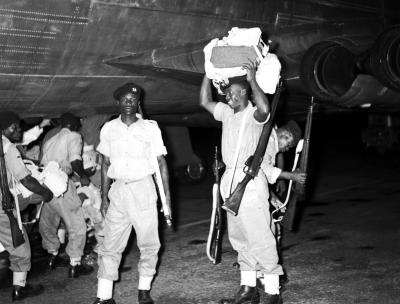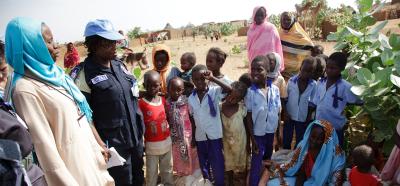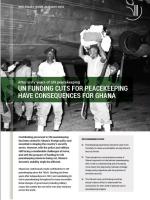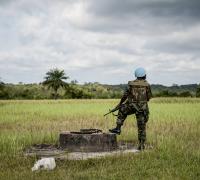UN funding cuts for peacekeeping have consequences for Ghana

Contributing personnel to UN peacekeepinghas been central to Ghana’s foreign policy andessential in shaping the country’s security sector. However, with the police and militarystill facing considerable challenges at home, and with the prospect of funding for UN peacekeeping missions being cut, Ghana’s domestic stability might be affected.
■ There should be a comprehensive review of Ghana’s approach to international peacekeeping with a view to understanding and articulating more clearly the relationship between strategic foreign-policy objectives and the provision of domestic security.
■ The UN and troop-contributing countries should make an effort to understand the implications for them both of planned cuts in peacekeeping budgets.
Ghana has continuously made contributions to UN peacekeeping since the 1960s. Starting just three years after independence in 1957, and maintaining its role in peacekeeping throughout its many unconstitutional changes of government, including military coups, the country has served in over sixty missions across the world.
There is a whole range of possible interests behind a country’s decision to contribute to peacekeeping: gaining international recognition, earning an income with which to fund the military and police, promoting norms and values, and building an identity for the security institutions involved. All these factors motivated Ghana’s initial decision to send troops to the United Nations Operation in the Congo (UNOC) in 1960 and have continued to do so up until today.
Decolonization and continental stability
One of the main factors motivating Ghana to contribute to UNOC was the personal relationshipbetween two like-minded prime ministers, Ghana’s Kwame Nkrumah and the Congo’s Patrice Lumumba. Both were ideologically charged by a desire to rid Africa of its colonial tutelage and imperialism. For Nkrumah in particular, the Congolese crisis presented a unique opportunity to pursue his “grand strategy” of decolonization, Pan-Africanism and non-alignment on the continent.
If a country like Ghana stops contributing troops
to UN missions, it could have a destabilizing
effect on national politics more generally.
A related circumstance that shaped Ghana’s decision to contribute had to do with regional cooperation and African solidarity. Against this background, Ghana, together with eight other African countries, was persuaded by the then UN Secretary-General, Dag Hammarskjold, to support the Congolese government.
Finally, an explanation that still rings true today revolves around Nkrumah’s own leadership ambitions of and his desire to consolidate his international influence, status and prominence. Participation in peacekeeping offered, and continues to offer, a mechanism to exert an influence in world affairs, thus enhancing Ghana’s image and prestige in the international system. This legacy and the impetus behind it remain in place and constitute a considerable driving force behind the country’s continued engagement. Indeed, it is noticeable that, regardless of the type of government in Ghana – military or civilian – the decision to deploy troops to peacekeeping missions has typically been consensual across the political spectrum.
Since the Cold War the predisposition for regional cooperation has partially been transformed into an act of self-protection. West African countries like Liberia, Sierra Leone, Côte d’Ivoire and more recently Mali experienced partial or complete state collapse and civil war in the 1990s and 2000s. Others, such as Guinea, Niger and Burkina Faso, have experienced either military coups or sustained attacks by insurgent groups.
Ghana shares its political and cultural history with countries in the region, especially its immediateneighbours. This, and geographical proximity, have made regional engagement pertinent, while peacekeeping abroad has been cast as a measure of conflict prevention at home.
Accountability abroad
After almost six decades of peacekeeping contributions, the roles and tasks performed by Ghanaian personnel have expanded substantially to meet the doctrinal shift from traditional peacekeeping to contemporary multidimensional peace operations. Peacekeeping is no longer a matter of maintaining ceasefires because having peacekeepers on the ground does not necessarily signal that conflict has ended. The scale of the tasks and the skill sets required are many and varied. They increasingly go beyond typical military and policing duties to involve supporting the establishment of functioning liberal-democratic states, for example, through governance-related security-sector reform.
In mission areas, it has been observed how the Ghanaian army initially seeks to establish a strong relationship and trust with the local population. This is usually done by observing the rules of engagement, respecting customs and traditions in the area of deployment, and not imposing a military culture where they are based. This building of trust and relationships has proved important for the success of the Ghanaian troops, and not least their safety.

Effects at home
There is no doubt that Ghana’s long-standing participation in peacekeeping has had fundamental implications for the police and military once they return, shaping the country’s governance system and practices of internal security provision that involve both the police and the military, as well as constituting considerable economic incentives. Indeed, there are strong indications that it has contributed to consolidating the democratic process within Ghana itself, dampening down the military’s political ambitions over time.
However, the military, and particularly the police, have faced considerable criticism for their failure to deliver on their mandate by effectively addressing internal security challenges without military support.
The relationship between contributions to peacekeeping missions and accountability domestically is not a simple one. The Ghana case clearly shows this and begs the question of exactly how – not if – contributing to state-building along liberal-democratic lines globally has a spill-over effect on domestic security sectors.
There are many instances of the alleged involvement of police and military officers in evidence tampering, the disappearance of crime exhibits and brutality against civilians. Indeed, the Ghana Police Service is consistently ranked at the top of corruption perception surveys in the country.
Extortion and bribery are considered widespread among officer ranks. Some act as private debt collectors and set up illegal checkpoints. Others extort irregular payments from citizens or from business associates of the detained. Within the defence sector, the Ministry of Defence and the military apparatus are often accused of invoking considerations of national security to hide key information from tax-payers.
The future of peacekeeping is unclear
In all these considerations regarding the link between international peacekeeping and domestic security provision, one thing is clear: the future of UN peacekeeping is uncertain. When in 2017 US President Donald Trump proclaimed that he would cut more than a billion USD from global peacekeeping, the UN announced plans to pull more than USD 600 million from its peacekeeping budget.
The proposed budget cuts are not only the result of US policy changes, but also of a similar desire on the part of the EU to reduce peacekeeping costs. These developments will make it impossible for the UN to continue its essential peacekeeping work. They call for reflection on the possible implications of these radical changes in UN peacekeeping for contributing countries like Ghana. More specifically, how will the cuts shape the future of Ghana’s military and police, as well as its broader foreign policy?
Specifically, it has often been argued that contributions to peacekeeping may very well have reduced the likelihood of military engagement in domestic politics, as they give the army a clear and focused role abroad. If a country like Ghana stops contributing troops to UN missions or if its ability to do so declines considerably, it is legitimate to be concerned about whether this could have a destabilizing effect on national politics more generally.
This is all the more likely because Ghana’s involvement in UN peacekeeping is presented by policy-makers and politicians alike as one of the centrepieces of the country’s foreign policy.
This policy brief is produced with support from the DanishMinistry of Foreign Affairs.
DIIS Experts



